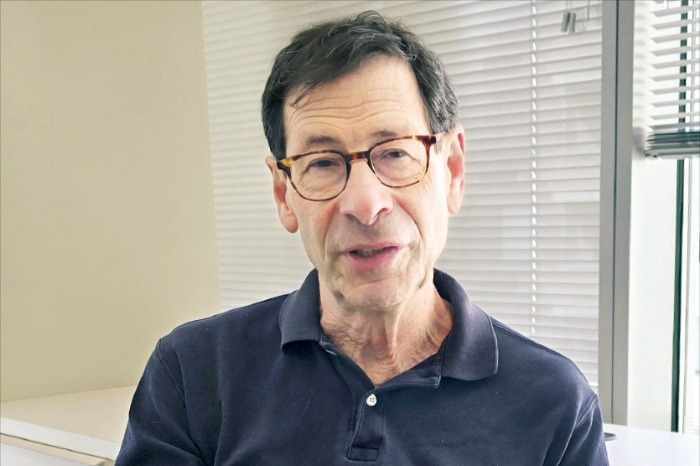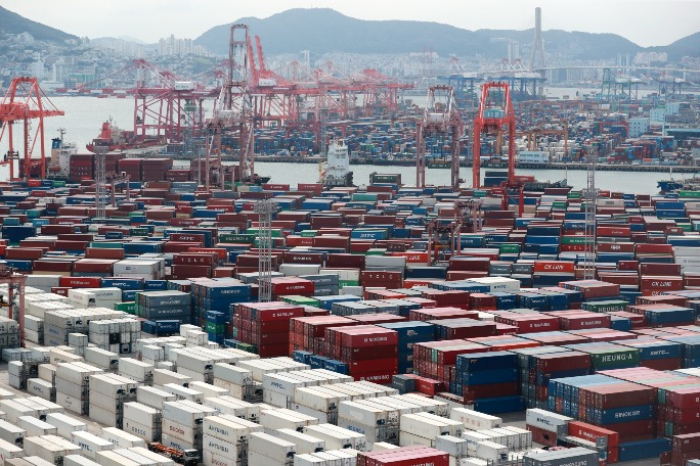US tariffs add risk premium to dollar assets: Maurice Obstfeld
Washington’s pressure may push trading partners away from the US-centered global system, the UC Berkeley professor warns
By Apr 29, 2025 (Gmt+09:00)
LG Chem to sell water filter business to Glenwood PE for $692 million


KT&G eyes overseas M&A after rejecting activist fund's offer


Kyobo Life poised to buy Japan’s SBI Group-owned savings bank


StockX in merger talks with Naver’s online reseller Kream


Meritz backs half of ex-manager’s $210 mn hedge fund



WASHINGTON, D.C. – The US tariff increases are adding risk premiums to dollar-denominated assets, undermining the dollar’s role as a global safe-haven and liquidity asset, said Maurice Obstfeld, a professor emeritus of economics at the University of California, Berkeley.
The tariff hikes, announced in March and paused for 90 days, are also unlikely to resolve the fiscal deficits of the world’s largest economy and may instead prompt other countries to decouple their trade and financial systems from the US, he warned.
“If there's a lot of disruption to the dollar status, if people stop trusting the dollar and if they stop trusting the US as a responsible custodian of global economic stability, those advantages to the US go away,” he said in a recent interview with The Korea Economic Daily.
RETURN TO NORMALCY?
Obstfeld, a senior fellow of the Peterson Institute for International Economics, cautioned that the US would not be able to restore the trust it once enjoyed in the global trading system in just a few years.
“We're in the middle of a very turbulent period, and it's impossible to say when normalcy will return, if it will ever return,” he said
RESPONSE TO STEPHEN MIRAN'S COMMENTS
The former chief economist of the International Monetary Fund rebuffed recent remarks by Stephen Miran, chairman of President Trump’s Council of Economic Advisers.
In a speech at a Hudson Institute event on April 7, Miran argued that China benefits substantially from international security and financial systems largely financed by the US, positioning the US as a victim within the current global economic structure.
The dollar’s role as a global reserve asset has made US-made products more expensive compared to Chinese and other imports, contributing to trade deficits and weakening the US manufacturing sector, ultimately harming many working-class families, Miran argued.
However, Obstfeld noted that the US remains a beneficiary of the current trade system and continues to play a crucial role globally as the provider of the reserve currency, adding: "The global role of the dollar is an immense advantage for the US."
The professor also emphasized that there is no direct connection between the US trade deficit and the US supply of dollars to the rest of the world.
“The most obvious way and the most beneficial way to reduce the trade deficit is to narrow the federal government's fiscal deficit,” he said.

RECOVERY OF US MANUFACTURING?
Obstfeld also warns that tariff hikes will not reinvigorate the US manufacturing industry.
Even after manufacturing companies are reshored to the world's largest economy, they will not generate large numbers of jobs, except in some advanced manufacturing and services, because the US economy has become far more capital and tech-intensive.
“Strong young men earning high wages by working on the auto assembly line, as we had in the 1950s. It's just not coming back and can't be.”
NO FINALITY, NO CREDIBILITY
He advised Washington's trading partners to respond to the US tariff policies based on their specific circumstances, adding: “It has to deal with the reality that there's no finality, there's no credibility on the other side."
“Korea has to think about, basically, more regional cooperation. Like with Russia, for example," he said.
"It seems to be a good time for Korea to join the CPTPP and strengthen ties with regional partners through ASEAN and extended ASEAN countries, because a lot of countries in the region are in a similar situation.”
The CPTPP stands for the Comprehensive and Progressive Agreement for Trans-Pacific Partnership. It encompasses Australia, Brunei, Canada, Chile, Japan, Malaysia, Mexico, New Zealand, Peru, Singapore and Vietnam.
Obstfeld is a co-author of “International Economics: Theory and Policy” alongside Paul Krugman, a professor at the City University of New York Graduate Center and Marc Melitz, a Harvard University professor.
He also co-authored “Foundation of International Macroeconomics” with Kenneth Rogoff, another Harvard University professor.
Write to Sangeun Lucia Lee at selee@hankyung.com
Yeonhee Kim edited this article.
-
 Business & PoliticsTrump Jr. to visit Seoul next week to meet Korean business leaders
Business & PoliticsTrump Jr. to visit Seoul next week to meet Korean business leadersApr 23, 2025 (Gmt+09:00)
2 Min read -
 Business & PoliticsSeoul mulls joint review of Alaska LNG project with Japan, Taiwan, Vietnam
Business & PoliticsSeoul mulls joint review of Alaska LNG project with Japan, Taiwan, VietnamApr 27, 2025 (Gmt+09:00)
4 Min read -
 Business & PoliticsSeoul, Washington agree on July tariff deal framework in '2+2' trade talks
Business & PoliticsSeoul, Washington agree on July tariff deal framework in '2+2' trade talksApr 25, 2025 (Gmt+09:00)
4 Min read -
 AutomobilesHyundai to launch 42 new cars to cope with Trump tariffs, EV slowdown
AutomobilesHyundai to launch 42 new cars to cope with Trump tariffs, EV slowdownApr 20, 2025 (Gmt+09:00)
4 Min read -
 Shipping & ShipbuildingS.Korean shipbuilders rally as Trump hints at buying foreign ships
Shipping & ShipbuildingS.Korean shipbuilders rally as Trump hints at buying foreign shipsApr 11, 2025 (Gmt+09:00)
2 Min read -
 Business & PoliticsSamsung, LG review strategies as Trump slaps Vietnam with steeper tariffs
Business & PoliticsSamsung, LG review strategies as Trump slaps Vietnam with steeper tariffsApr 03, 2025 (Gmt+09:00)
5 Min read -
 Business & PoliticsUS Chamber of Commerce sees Korea’s business penalties as trade barrier
Business & PoliticsUS Chamber of Commerce sees Korea’s business penalties as trade barrierMar 23, 2025 (Gmt+09:00)
4 Min read -
 Business & PoliticsS.Korea wary of inclusion on US ‘Dirty 15’ nations list for reciprocal tariffs
Business & PoliticsS.Korea wary of inclusion on US ‘Dirty 15’ nations list for reciprocal tariffsMar 19, 2025 (Gmt+09:00)
3 Min read -
 EnergyTrump-driven energy boom spurs Korean firms to hike US gas investments
EnergyTrump-driven energy boom spurs Korean firms to hike US gas investmentsMar 10, 2025 (Gmt+09:00)
4 Min read -
 Business & PoliticsTrump says Korea interested in Alaska gas project; Korean firms skeptical
Business & PoliticsTrump says Korea interested in Alaska gas project; Korean firms skepticalMar 05, 2025 (Gmt+09:00)
3 Min read -
 Business & PoliticsKorea mulls raising US oil imports to cope with Trump trade policies
Business & PoliticsKorea mulls raising US oil imports to cope with Trump trade policiesNov 20, 2024 (Gmt+09:00)
4 Min read -
 EconomyS.Korea, Japan ink first free trade deal via 15-country trade bloc
EconomyS.Korea, Japan ink first free trade deal via 15-country trade blocNov 16, 2020 (Gmt+09:00)
3 Min read


